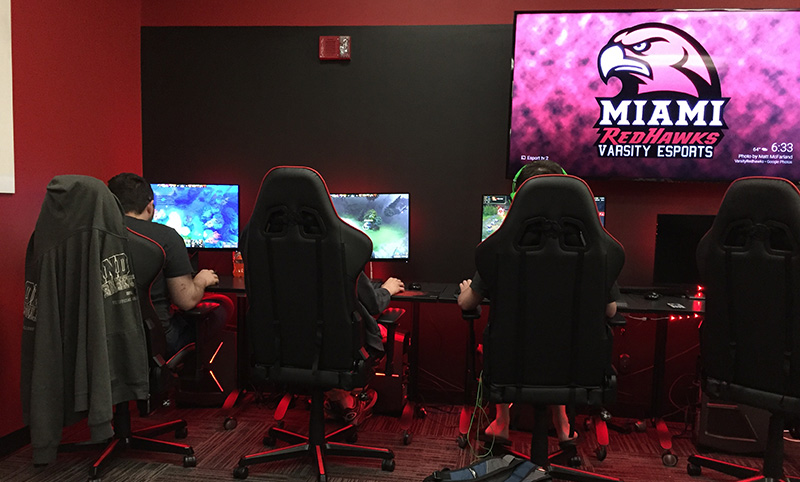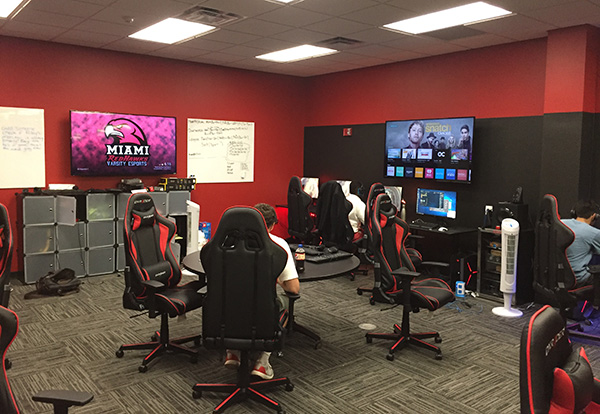

University Libraries, AIMS and IT services partner on groundbreaking esports arena
By David Mulford, interim communications specialist, University Libraries
A new competitive landscape is building across colleges and universities nationally, and the Miami University Libraries, in partnership with the Armstrong Institute for Interactive Media Studies and IT services, is helping take the game – or gaming – up a notch.
Miami University’s esports program, officially launched as a varsity program in the fall, recently moved into a new home – a state-of-the-art esports arena on King Library’s first floor. The arena is one of the first esports facilities at any university library in the nation.
“Throughout the history of the Miami University Libraries, our focus has been on anticipating and evolving to meet our students’ emerging needs and pursuits,” said Jerome Conley, dean and university librarian.
“Technology is central to that mission in today’s environment, and we value the partnership with AIMS and Miami’s nationally ranked digital game studies program. This was an exciting opportunity to create a space for something truly groundbreaking that has been inspired by the energy of our students,” he said.
A generous gift from IT services covered the cost of the chairs that make the space work so well, said AIMS Director Glenn Platt, C. Michael Armstrong Chair of Interactive Media and professor of marketing. “Our relationship with IT is critical and its support has been invaluable,” Platt said.
Equipped with dimmable lighting and painted in Miami red with black details, the arena features 16 gaming stations. Each gaming computer possesses high-end graphics cards and monitors, specially designed to keep up with the intense graphic demands of modern gaming. Two large-screen televisions are available for viewing games in progress or reviewing previous games.

New dedicated space for varsity esports is a dream come true for students. (Photos by David Mulford.)
According to recent graduate Adam Darwiche (Miami ’17), one of the students who helped pioneer esports at Miami, the investment by the University Libraries and AIMS makes a significant and validating statement about the student-led effort to bring esports to Miami.
“I still remember the first day I walked into the arena,” Darwiche recalled. “I felt like all the work we had done to get the program together and get things started was worth it. We were finally, truly a team. I really can't overstate how much the esports arena means to this program.”
Miami esports supports teams for three games: Hearthstone, Overwatch and League of Legends. Each team has access to the arena to practice and fine-tune their skills for competitive matches. On average, team members practice anywhere from eight to 16 hours per week with competitions taking place throughout the week. All three Miami esports teams can utilize the arena at once if necessary.
The National Association of Collegiate esports (NACE) formed in 2016 with the goal of structuring and advancing esports on the collegiate level. Miami was one of 20 member institutions entering the 2016-2017 academic year and the largest in terms of enrollment.

Miami’s League of Legends team finished second in last year’s inaugural League of Legends invitational.
According to Phill Alexander, Heanon Wilkins Faculty Fellow, AIMS instructor and adviser to the esports program, Miami is a trendsetter among colleges and universities nationally in supporting this growing phenomenon.
“Our varsity esports program is one of the first at a major research university in the United States,” Alexander said. “esports introduces our students to a multibillion-dollar industry that, according to a 2015 ESPN the Magazine article, has more eyes on its major tournaments than Major League Baseball, the NBA or the NHL. That's a huge audience, a huge industry and a growing demographic. Miami is poised to be a leader and major player in that.”
Miami’s League of Legends team finished second in last year’s inaugural League of Legends invitational, falling to national champion Maryville University. Overwatch finished eighth nationally, and Hearthstone finished among the nation’s top 16. All the program’s competitions are broadcast on the team’s Twitch channel.
“Having a space where all the teams can compete and practice together really helps us improve and come together as a team,” said senior Matt Samuelson, a student director and analyst for the League of Legends team. “The fact that the Libraries are willing to house us is something that really puts Miami at the forefront, not only in the Midwest but also in the nation.”
For more about Miami esports, visit the program’s official website: Miami RedHawks Varsity eSports.
